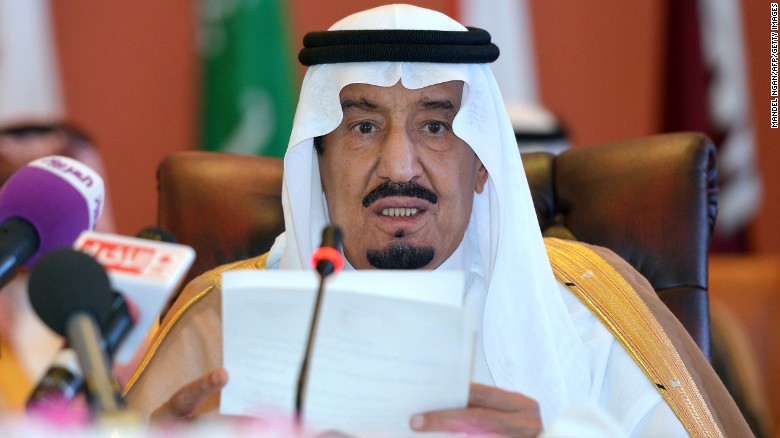Saudi Arabia’s King Salman bin Abdulaziz Al Saud will no longer be in attendance at President Barack Obama’s meetings with Arab leaders from the Gulf Cooperation Council this week.
The late change of plans, could be seen as a snub to Obama, coming just four days before the start of two days of sessions beginning Wednesday and culminating in a Camp David summit on Thursday.
“We first learned of the King’s possible change of plans from the Saudis on Friday night,” said a senior administration official. “This was confirmed by the Saudis on Saturday. We coordinated closely with our Saudi partners on the alternate arrangement and timing of the announcement, and look forward to welcoming Crown Prince Mohammed bin Nayef and Deputy Crown Prince Mohammed bin Salman.”
The Royal Embassy of Saudi Arabia in a statement acknowledged the King’s absence was “due to the timing of the summit, the scheduled humanitarian ceasefire in Yemen and the opening of the King Salman Center for Humanitarian Aid.”
Saudi Arabia has been leading a coalition launching air strikes against the Houthi rebels which have gained control of much of Yemen.
Crown Prince Mohammed bin Nayed will now lead the Saudi delegation in his place, which will also include Deputy Crown Prince Mohammed bin Salman.
he shuffle comes after the White House announced on Friday that the King would not only be in attendance but would also have a one-on-one meeting with Obama.
On Friday, White House deputy press secretary Eric Schultz told reporters King Salman was to meet with the President on Wednesday at the White House, ahead of an expanded dinner with the other leaders of the Gulf states.
The White House is downplaying the significance of the change.
A senior administration official told CNN the White House was aware of the King’s change of plans in advance and doesn’t think it’s because of any substantive disagreement.
“We look forward to the attendance of Crown Prince Mohammed bin Nayef, with whom the President has met on several occasions, including in the Oval Office in December 2014 and January 2013, as well as Deputy Crown Prince Mohammed bin Salman, who the President met when he traveled to Riyadh in January,” the senior administration official said.
In April, Obama revealed his intention to invite the Gulf Cooperation Council states to a summit the day the framework nuclear deal with Iran was announced as the administration tries to ease the concerns of those countries over the agreement with Tehran.
“When it comes to external aggression, I think we’re going to be there for our (Arab) friends — and I want to see how we can formalize that a little bit more than we currently have, and also help build their capacity so that they feel more confident about their ability to protect themselves from external aggression,” the President told The New York Times in an interview last month.
Building up that common defense infrastructure and architecture for the Gulf region will be a key part of this week’s summit, an administration official told CNN.
The summit is set to work towards a proposal for a common ballistic missile defense system that could act as a deterrent to a potentially nuclear armed Iran, a U.S. official confirmed to CNN.
The official said the goal would be for the Gulf states to operate the missile defense system themselves, with the U.S. providing advisory and technical support.
A ballistic missile defense system for the Gulf Cooperation Council is something the Obama administration has recommended for some time, the official noted, and also cautioned that missile defense is only one component of a range of security measures that will be discussed.
Just last Thursday, Secretary of State John Kerry met with King Salman in the Saudi capital Riyadh to prepare for the GCC Summit and to discuss a ceasefire in Yemen. The next day in Paris the Saudi Arabian Foreign Minister, Adel Al Jubeir, announced a five-day ceasefire beginning Tuesday in Yemen so humanitarian aid could be distributed.






























